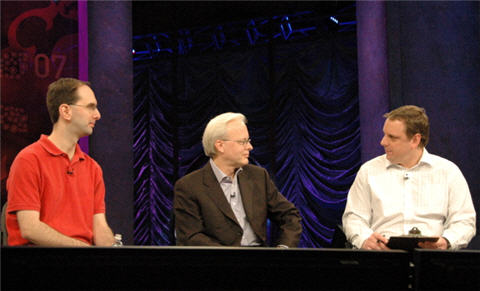MIX07: Q&A with Ray Ozzie and Scott Guthrie

After demos of Silverlight to the MIX07 crowd, Techcrunch founder and editor Mike Arrington interviewed Ray Ozzie, chief software architect, and Scott Guthrie, general manager of Microsoft's developer platform.
Arrington first asked Ozzie about the notion of a Web OS, a term Ozzie didn't use in his answer. Instead, he talked about the emerging world of software and services enabled by the Web. Interestingly, but not unexpectedly, he said that there is an advantage to having service integration under one umbrella, for areas such as common monetization, SLAs for APIs.
Sounds a bit like a Web OS + desktop OS = Webtop OS.
Ozzie also mentioned the benefit in the example of Amazon's S3 and EC2 infrastructure services physcially co-located. In other words, a Microsoft software and infrastructure platform for delivering software + services is ideal, from Microsoft's point of view. Loosely coupled benefits from tighter coupling in vital parts of the core.

Scott Guthrie, Ray Ozzie, Mike Arrington
On the question of competing with Google, Ozzie responded: "The DNA of Microsoft is not going into a space unless we can change the game and win in some form. More interesting from a competitive standpoint related to Google and large incumbent competitors in general is how Microsoft approaches it and secondary and tertiary effects."
He alluded to moments in Microsoft's history when the company was spurred into action by competitive forces, citing open source and Java as leading to cultural changes and reshaping Microsoft, a side or secondary effect of the competitive battles. "If you go back to Sony years ago, the Playstation 2 look unassailable. A side effect, secondary effect was the creation of an entire entertainment and devices division in Microsoft," Ozzie said.
Ozzie went on to say, "From a Google perspective, the secondary impacts have already begun to happen," resulting in the ad model Microsoft had never considered before. "With services, we decided to make an investment and scale the back end for search and ads, now we are thinking about how to 'platformize' it, so we developers can better take advantage of it." Today's announcements around Silverlight, Silverlight Streaming and Expression Studio are about creating a rich Interent application, browser-agnostic platform and ecoystem.
While Ozzie didn't say it, the implication is that Microsoft looks at Google as an assailable kind of Playstation 2, as well as Abobe Flash/Apollo.
Regarding a cloud-based Microsoft Office suite, Ozzie first mentioned Office Live, a set of services, not productivity apps, for small businesses lacking IT support, currently with about 70 million 350,000 customers worldwide. "[Office Live] will progressively broaden...we have no specific announcements today," Ozzie said. "In my opening remarks, I laid out a design pattern and you will see it replicated through the offerings we do. You use a PC for what a PC is good for and look at the overall scenario, what is est for the PC and what in services as standalone or in conjunction with a PC or mobile device. In all of our products can use that pattern to extrapolate."
In other words, Microsoft doesn't feel an urgent need to make Office for the cloud, which is consistent with what Jeff Raikes told me last week--there isn't any demand among customers, or at least not from the customers paying for Office 2007.
"We just shipped a great product Office 2007....each module has specific really good improvements and that's what we are selling right now," Ozzie said. He also made clear that Microsoft's strategy is not to take applications and merely port them to the Web or a mobile device. "You have to step back and look at the scenario," he reiterated.
Arrington asked whether Silverlight is a Flash killer, and then modified the question to ask if Microsoft can be successful versus Adobe's Flash. Guthrie responded that Microsoft is focusing on the interactive experience and how designers and developers work together, and creating a platform "It's not a case to switch wholesale engineers from the tool sets and products that they use," Guthrie said. He added that with Silverlight and .NET Microsoft is trying to figure out how to make it easier to run dynamic languages on top of .NET and componentize elements to get rid of a lot of the plumbing work.
Finally, Arrington asked Ozzie how he would rate himself since he took over as chief software architect from Bill Gates last June. He explained that his transition over the last year was aided by four dimensions inside the company: Connected entertainment, connected productivity, connected business, and the platform underlying all the connected businesses. The company was already involved in the connected (software + services) model, but not as an overall, orchestrated strategy for the company.
While the attention was on getting Vista and Office 2007 out the door, Ozzie began incubating some projects last year and now people are "milling out the code," he said. "I am quite pleased with where we are. If you look at breath and depth of the offerings and the potential scenarios, the opportunity is great," Ozzie said.
The opportunity is great, given the Internet has been a kind of reset button for the industry, and Microsoft has shown in the past that it can be persistent in coming from behind to win in a market. Both Google and Adobe have significant consumer and developer support, so it will be a very uphill battle.
Ozzie also acknowledged that he has some big shoes to fill: "Of course I am living in the shadow of my predecessor. A founder leaves an imprint on a company forever. I am not Bill Gates, but I am who I am....My approach is different than Bill's, but it's working," Ozzie said.